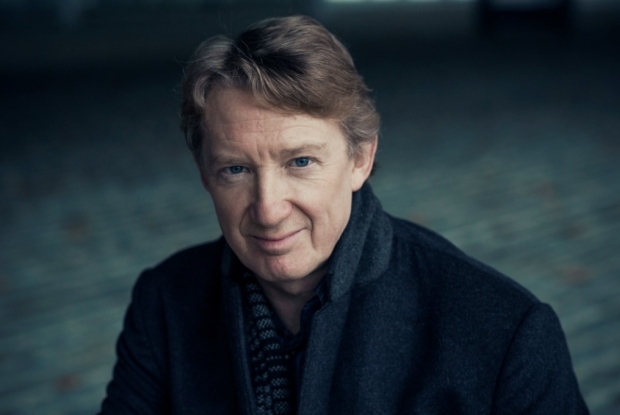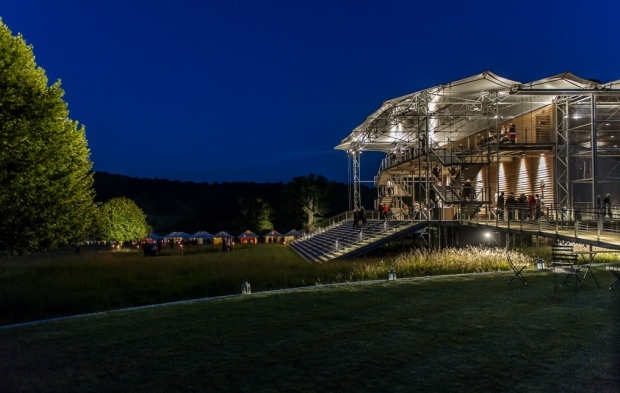Douglas Boyd and Garsington Opera: 'It's every day of my life'
The artistic director on this year’s festival and his ambitious plans for the future

© Jean-Baptiste Millot
"I don't miss it. I was lucky to work with incredible people like Claudio Abbado and Nikolaus Harnoncourt, so I look back and feel very blest. But when I started conducting I could feel it was getting more difficult because you've got to find time to practise! I came to a decision that I was either going to play properly or not at all, so I did my last concert in Paris with Abbado then put the oboe away in its box and it's never been opened since."
During a break in rehearsals for Mozart's Così fan tutte, the opera he's conducting to open this year's festival (it will joined in short order by Strauss's Intermezzo and Britten's Death in Venice), Boyd is demolishing a supermarket sandwich with indigestible haste. All part of his hectic daily routine. "It's mental", he concedes.
"Garsington is officially part-time but in fact it's every day of my life. I've had the job for two years now and I haven't been sitting on my backside." Whereupon, not for the last time in our encounter, he evangelises "I think we've got a story to tell".
"I really like building relationships with orchestras, and I've been very lucky. The Manchester Camerata was an incredible break: they work on a shoestring but they're extraordinary. I've still got some time left with the Musikkollegium Winterthur and now I'm also taking over the Orchestre de Chambre de Paris, which is very exciting. We're talking about bringing some Garsington operas to Paris and collaborating with them. We're planning to take Le nozze di Figaro and Fidelio."
Two years into this job, Boyd confirms that the 2015 festival is the first he's programmed himself. "This season is completely my repertoire." So can we read anything into it about how the future's going to shape up? "Yes, I think you can read into it that Mozart will remain fundamental, and hopefully we'll develop a house style for him. And Richard Strauss is much loved by our members so I want to reintroduce him too. This year's Strauss opera, Intermezzo, is hardly ever done, but it's wonderful! In his anniversary year everything else seemed to be performed, but never that.
"Garsington has always been synonymous with rare opera. I'm not against that, but I think we need to be a grown up summer festival now, not a niche festival. The trouble with rare opera, sometimes, is that it's rare for a reason. Not always — Intermezzo is a case in point — but I think we can afford to be a bit bolder now."
"Our theatre at Wormsley is special for all sorts of reasons. For performers it retains the intimacy: it has 605 seats and even from the very back you can see the slightest gesture. On the other hand it's a pretty big stage, and we've increased the capacity of the orchestra pit so that we can think about doing grander opera."

© Clive Barda
Which brings us to the new partnership with the Philharmonia Orchestra, who'll be playing for one work each season from 2017 onwards. Boyd is at pains to say that it's not a snub to the house band.
"We're totally committed to our own orchestra. They're members of Garsington in more than just spirit, and they'll continue to do three operas a year as they do now. But we're expanding to a fourth, adding one larger scale opera each year, which is where the Philharmonia comes in. It's complementary to what we already do, and it will increase our options and our profile. They'll be here for five years initially, starting in 2017 with Pelléas et Mélisande."
There's a fourth event this year as well: a joint venture with the Royal Shakespeare Company under the creative guidance of its own artistic director, Greg Doran.
"A Midsummer Night's Dream is one of my favourite pieces, both as a play and as Mendelssohn's music. It will be an abridged version of the text: the orchestra and the Garsington Young Artists will be onstage and I'll be conducting.
"It started as three performances, but these sold out immediately so we've scheduled an extra one at Garsington and then we'll take it to Stratford-upon-Avon eight or nine days later, with three London performances at the Queen Elizabeth Hall between the two. So I think we've got a story to tell."
world premiere choreography
This pattern will continue next year through a collaboration with the dance company Rambert on Haydn's The Creation. "We'll be doing it with our soloists, chorus and orchestra, and Rambert will do a world premiere choreography for it." The season will also feature three more new productions: Tchaikovsky's Eugene Onegin, Rossini's L'italiana in Algeri and Mozart's Idomeneo.
Looking further ahead, in 2018 Boyd plans to schedule a brand new opera on the main stage. "We should champion modern composers", he says, emphatically. "I think we have a responsibility." And he isn't worried about selling it to the Garsington audience. "Look at Covent Garden and how successful Thomas Adès and George Benjamin and Mark-Anthony Turnage have been there — and how Birtwistle's The Minotaur was completely packed.
"With my old life we did so much opera with Abbado and Harnoncourt and Solti, so I've seen it at the highest level. But opera has learnt an enormous amount from theatre in the last 20 years. I found an old DVD of an opera we played in, and if you did a production like that nowadays you'd be laughed out of court."
Our conversation turned to revivals ("now that we're going up to four operas they'll be a key part of our planning"), championing British talent ("we offer our young artists a lot — recitals, masterclasses…") and, in the wake of a successful release of Rossini's Maometto II, the prospect of further commercial CDs ("we need funds for all sorts of things, including recordings when they're worthwhile"), before Boyd rushed back to work. But even then he threw a parting shot over his shoulder. "And we've got Steuart Bedford for Death in Venice! He did the premiere you know."
Always a story to tell.
The 2015 Garsington Opera festival runs from Friday 5 June to Sunday 19 July












